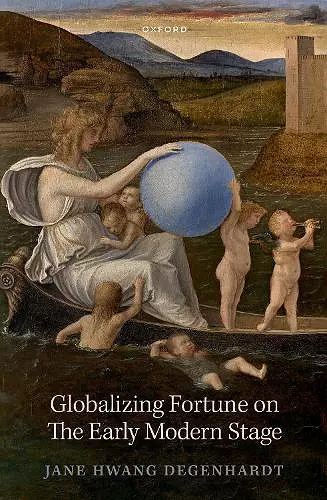Globalizing Fortune on The Early Modern Stage
Format:Hardback
Publisher:Oxford University Press
Published:25th Aug '22
Currently unavailable, and unfortunately no date known when it will be back

How were understandings of chance, luck, and fortune affected by early capitalist developments such as the global expansion of English trade and colonial exploration? And how could the recognition that fortune wielded a powerful force in the world be squared with Protestant beliefs about the all-controlling hand of divine providence? Was everything pre-determined, or was there room for chance and human agency? Globalizing Fortune addresses these questions by demonstrating how English economic expansion and global transformation produced a new philosophy of fortune oriented around discerning and optimizing unexpected opportunities. The popular theater played an influential role in dramatizing the new prospects and dangers opened up by nascent global economics and fostering a set of ethical practices for engaging with fortunes unpredictable turns. While largely derided as a sinful, earthly distraction in the Boethian tradition of the Middle Ages, fortune made a comeback on the English Renaissance stage as a force associated with valiant risks, ennobling adventures, and purposeful action. The early modern stage also reveals how a new philosophy of fortune led to economic exploitation and racialized exclusions. Offering in-depth discussions of plays by Shakespeare, Marlowe, Heywood, Dekker, and others, Globalizing Fortune demonstrates how the history of the English commercial theaterlike that of English seaborne expansionwas also a history of fortune. The public theater not only shaped popular understandings of fortunes role in a culture undergoing economic transformation, but also addressed this transformation from a unique position because of its own implication in London commerce, its reliance on paying customers, and its vulnerability to the risks and contingencies of live performance. Drawing attention to an archive of plays dramatizing maritime travel, trade, and adventure, this book shows how the popular stage shaped evolving understandings of fortune by cultivating new viewing practices and mechanisms of theatrical wonder, as well as modeling proper ways of acting in the face of unknown outcomes and contingency. In short, Globalizing Fortune demonstrates how the public theater offered the first modern understanding of fortune as a globalizing commercial and ethical phenomenon.
Recommended. Graduate students, researchers, faculty. * Choice *
This book adds much to our understanding of the early modern deployment of Fortune as both a literary trope and a framework for understanding the apparently arbitrary nature of earthly successes and catastrophes...The readings on which this characterization is built are fresh and lively, offering a wealth of new ideas in relation to an interesting mix of canonical and non-canonical texts that will make this book valuable to scholars and students well beyond those specifically interested in the histories of Fortune and trade. * Andrew Duxfield, University of Liverpool, The Spenser Review *
This book is a welcome development in new economic criticism for its careful consideration of the intersection of religion and mercantilism. * Emma Venter, The Seventeenth Century *
ISBN: 9780198867920
Dimensions: 242mm x 163mm x 18mm
Weight: 540g
256 pages